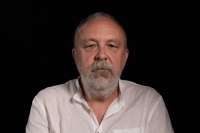I was raised in the spirit that people say some things at home and say different things elsewhere

Download image
Vladimír Trojánek was born on 7 March 1958 in Nové Město na Moravě, but grew up in Žďár nad Sázavou. His maternal grandfather founded the Markofon radio receiver factory in Brno in 1935. It was nationalized by the communists after 1948 and incorporated into the Tesla Brno company. His grandfather’s paternal brother lost his shoe business in Žďár nad Sázavou at the same time. After the Communists came to power, many of his relatives emigrated to the West. In 1964, Vladimír Trojánek started elementary school in Žďár. In 1968, he joined the Boy Scouts there. He attended it until 1970 when the Scout was canceled again. The troop then operated under the banner of the gym union. In ninth grade, he won a trip with the pioneers to the Soviet Union in a competition. During his subsequent studies at the grammar school in Žďár, he began transcribing samizdat literature. He also founded the band Rozpaky with his friends. His parents insisted he applies to the University of Economics in Prague after graduation, but he lasted only two years. In 1979, he transferred to the Faculty of Arts of Charles University, where he successfully graduated in 1984. During the 1980s, Public Security and State security repeatedly interrogated him in Žďár and persuaded him to cooperate. After graduating from university, he worked as a hauler for ČSAD (Czechoslovak state automobile transport) and as a hotel receptionist. He got married in 1986. In 1989, he and his wife moved from Žďár to Prague, where they still live today (2020). He continued to rewrite and distribute samizdat until the Velvet Revolution. Today, he publishes in various publishing houses under the pseudonym Jakub Šofar.

